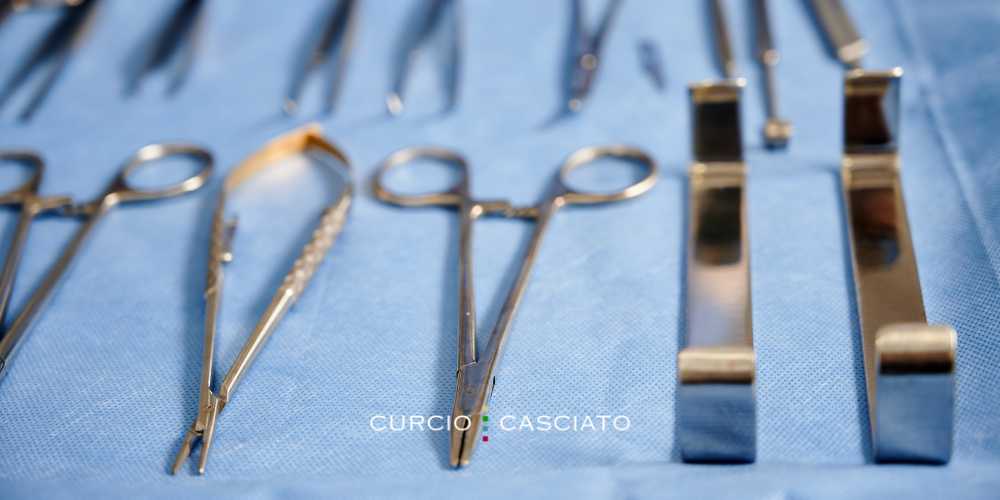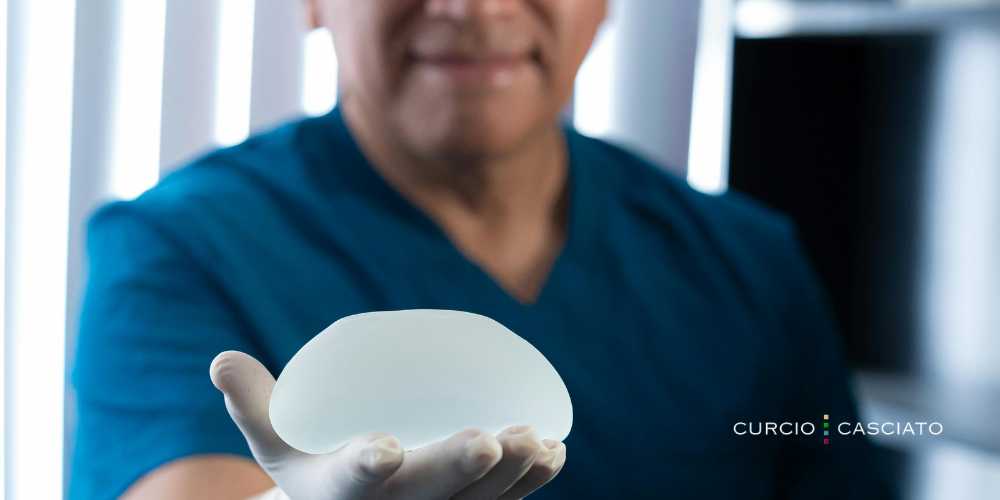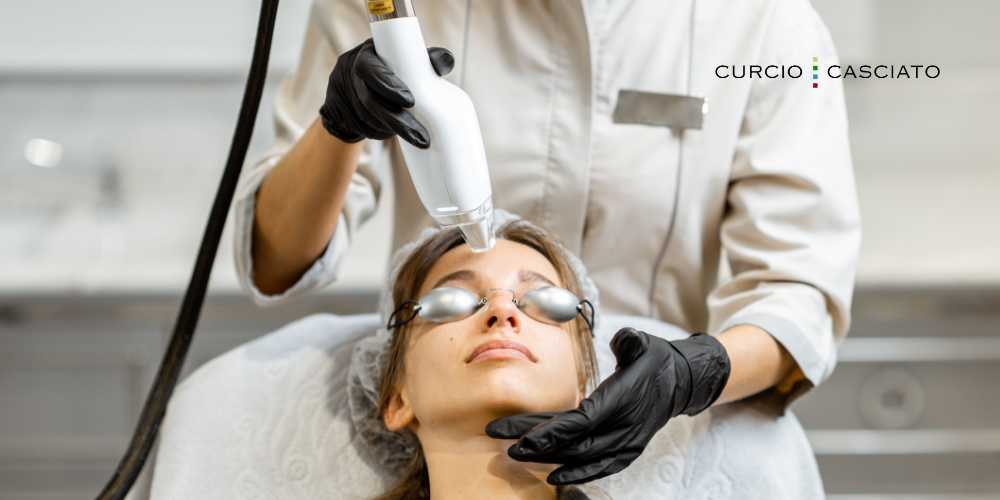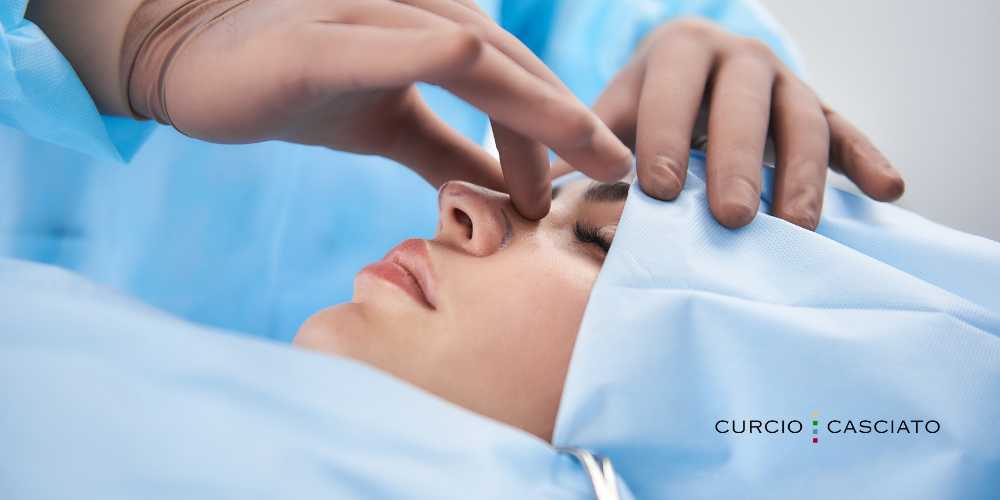Chicago Plastic Surgery Lawyer
PRACTICE AREAS
The Chicago plastic surgery malpractice lawyers at Curcio & Casciato handle medical malpractice cases involving cosmetic procedures and failed outcomes. Whether you were injured during a tummy tuck, breast augmentation, or another form of elective surgery, our team handles complex plastic surgery malpractice claims involving botched cosmetic surgery.
Many patients who suffer negative outcomes also incur mounting medical expenses, emotional trauma, and permanent physical pain, especially when cosmetic or plastic surgeons are not properly trained or fail to disclose possible complications.
If you’ve sustained a serious injury due to mistakes made by medical professionals during a surgical procedure, you may be entitled to file a medical malpractice claim. We handle medical malpractice cases on a contingency fee basis, so victims don’t owe any legal fees unless we win.
Call a Chicago cosmetic surgery malpractice attorney at 312-321-1111 to schedule a free consultation and begin the attorney-client relationship.

Can You Sue a Plastic Surgeon in Illinois?
Yes, you can sue a cosmetic or plastic surgeon in Illinois if their negligence resulted in serious injuries during or after a cosmetic surgery procedure. Our injury lawyers in Chicago handle plastic surgery malpractice claims involving serious injury, nerve damage, or other plastic surgery errors.
Victims may seek compensation through medical malpractice lawsuits, depending on the evidence and ability to prove that the mistake was made due to negligence. If you’ve been injured from a botched cosmetic surgery, a Chicago plastic surgery malpractice lawyer can assist in pursuing compensation for medical bills, lost wages, and emotional trauma.
If you’ve suffered an injury, contact our law firm to schedule a free consultation with our Chicago plastic surgery malpractice attorneys.
Chicago Cosmetic Surgery Malpractice Lawyers Handling Cases of Plastic Surgery Gone Wrong
Our medical malpractice lawyers in Chicago, IL, understand how to prove medical malpractice and have a track record of successful outcomes involving victims of the following. Contact our law firm for a free consultation to learn about your legal options.

Cosmetic Procedures Performed on the Wrong Body Part
Surgical procedures on the wrong body part are among the most devastating types of plastic surgery malpractice claims. These plastic surgery errors often occur when a cosmetic surgeon fails to verify the surgical site and medical history, leading to permanent disfigurement and additional medical expenses. A Chicago plastic surgery malpractice attorney can investigate whether medical professionals followed proper protocols and file a medical malpractice claim to hold them accountable.
Surgical Instruments Left Inside the Patient
Surgical instruments left inside patients after cosmetic surgery procedures can lead to dangerous infections, internal damage, and long-term complications. These cases often result in emergency corrections, increased medical bills, and significant physical pain. An experienced Chicago plastic surgery malpractice lawyer can file a medical malpractice lawsuit on your behalf and work with medical experts to prove that the cosmetic surgeon failed to meet the medical standard of care in Illinois.
Plastic Surgery Nerve Damage
Nerve damage during cosmetic or plastic surgery can cause permanent loss of sensation, muscle weakness, or chronic pain and suffering. This complication often results from plastic surgery errors made by cosmetic surgeons during elective surgeries, like facelifts. If you’ve been injured, a Chicago plastic surgery malpractice attorney can work with medical expert witnesses in Illinois to build a strong medical malpractice claim, seeking compensation for medical costs and loss of function.
Cosmetic Disfigurement and Excessive Scarring
Cosmetic disfigurement and excessive scarring can result from plastic surgery errors, especially when cosmetic surgeons fail to follow proper technique or account for individual risk factors. These visible injuries may require costly reconstructive surgery. A skilled Chicago cosmetic surgery malpractice lawyer can file a claim to pursue compensation for the harm caused by negligent cosmetic procedures.
Plastic Surgery Infection
An infection after undergoing cosmetic surgery can lead to serious complications. These infections often occur when health & care professionals fail to prevent infections by maintaining sterile conditions before, during, or after the cosmetic procedures, such as tummy tucks. If you’ve suffered harm due to an avoidable infection, a Chicago cosmetic surgery lawyer can help you file a claim for medical malpractice and seek compensation.
Anesthesia Errors or Failure to Monitor Patients
Anesthesia errors or failure to monitor patients during or after undergoing cosmetic surgery can lead to possible complications and negative side effects, including blood clots, personal injuries, or even wrongful death. Even during minimally invasive procedures, an anesthesiologist must closely monitor the patient to identify potential problems and respond quickly. When anesthesiologists ignore inherent risks or fail to help patients suffering negative side effects, they can be held responsible. If you suffered an injury or a loved one died as a direct result of an anesthesia mistake, you may have a valid malpractice case. Contact a medical malpractice lawyer from our law firm for a free case evaluation to learn about your legal rights.
Necrosis After Plastic Surgery
Necrosis after plastic surgery occurs when tissue dies due to a lack of blood flow, often caused by poor technique or excessive pressure during surgical procedures, like breast reductions. This can result in open wounds, permanent scarring, and the need for additional procedures. A Chicago cosmetic surgery lawyer can investigate whether the cosmetic surgeon failed to recognize or prevent the condition and help ensure the case for medical malpractice results in fair compensation.
Botched Breast Reduction, Breast Implants, or Breast Lift
Botched breast reduction, breast implants, or breast lifts are among the most common types of cosmetic or plastic surgery cases our Chicago plastic surgery attorneys handle. While breast augmentations and reductions are often considered routine cosmetic surgeries, these surgical procedures carry inherent risks, especially when performed by negligent or improperly trained plastic surgeons.
Victims may suffer an injury, scarring, loss of sensation, or require corrective reconstructive surgery. It’s human nature to trust doctors. However, the best course after a botched plastic surgery is to speak with a law firm that can help prove negligence and file a case for medical malpractice. If you’ve been injured by plastic surgery errors, our experienced team can help you work with medical experts and seek compensation for other damages caused by careless health care professionals.
BBL Death
Injuries from gluteal fat grafting, also known as a Brazilian butt lift (BBL), can be catastrophic due to the cosmetic procedure’s unusually high risk. The BBL death rate is among the highest of any plastic surgery, often resulting from negligence during fat injection, causing fat embolism or organ damage. When a BBL results in the loss of a loved one, a wrongful death attorney in Chicago can help families seek justice through a wrongful death lawsuit against the negligent surgeon or staff.
Facial Paralysis After Botox or Filler Injections
Facial paralysis after Botox or filler injections can be a devastating complication resulting from improper technique, incorrect dosage, or unqualified providers. When plastic surgeons or other health & care professionals aren’t properly trained, fail to follow safety standards, patients may sustain long-term or permanent muscle weakness, asymmetry, or loss of facial movement. The Chicago paralysis lawyers at our law firm provide skilled assistance in these complex cosmetic surgery malpractice cases and can determine if your case is eligible for medical malpractice.
Laser Hair Removal Burns and Chemical Peel Burns
Laser hair removal burns and chemical peel burns are painful and often permanent injuries that can occur when cosmetic surgeries are performed by untrained or negligent doctors or staff. These burns may cause scarring, disfigurement, or require additional procedures, especially when proper safety protocols are ignored. If you’ve suffered an injury, a burn injury lawyer in Chicago, IL, can help hold the med spa or technician responsible for the injury and seek resources for your medical costs, lost wages, and other types of damages under Illinois law.
Organ Damage or Fat Embolism After Liposuction
Organ damage during or fat embolisms after liposuction can lead to fatal complications, including respiratory failure, internal bleeding, or death. These risks increase when cosmetic or plastic surgeons fail to follow protocols or perform the cosmetic procedure without adequate training. Patients may experience sudden pain, difficulty breathing, or collapse shortly after the surgical procedure. The Chicago internal organ damage lawyers at our law firm represent clients who sustain personal injuries from plastic surgery errors and can help file a medical malpractice claim to hold negligent doctors responsible for their actions.

What Happens If You Get Plastic Surgery in Another Country and Are Injured?
If you get plastic surgery in another country and suffer an injury because of a cosmetic surgery mistake, it may be difficult to pursue a medical malpractice claim in the U.S., since most foreign physicians aren’t subject to Illinois law or U.S. court jurisdiction. However, if a U.S.-based clinic, doctor, or medical tourism company referred you, they may share responsibility for the personal injuries sustained. A plastic surgery malpractice lawyer in Chicago can review the details and help you determine whether any negligence occurred that gives rise to a potential lawsuit.
How a Chicago Plastic Surgery Malpractice Attorney Can Help
If you’ve suffered an injury from plastic surgery malpractice in Chicago, a Chicago plastic surgery malpractice lawyer can help you understand your legal options and fight for the recovery you deserve.
Whether your case involves a tummy tuck, rhinoplasty, liposuction, facelift, breast lift, reduction, or augmentation, your Chicago cosmetic surgery lawyer will gather evidence, review your medical history, and determine whether the physician or hospital breached their duty of care to mitigate injuries.
Many patients suffer from blood clots, infections, or are left disfigured or with lasting deformities. Filing a lawsuit within the two-year statute of limitations is crucial. Your Chicago plastic surgery attorney can discuss what to expect during recovery, how damages are awarded in court, and whether you may be eligible for punitive damages.
Clients also receive guidance on how to hold the responsible doctor accountable. Contact our law firm today for a free consultation to discuss your personal injury resulting from plastic surgery malpractice.
Plastic Surgery Malpractice Settlements in Illinois
In plastic surgery malpractice, settlements are often reached before trial, allowing injured patients to recover resources without going to court. A Chicago plastic surgery malpractice lawyer will work to negotiate a fair amount based on medical costs, disfigurement, lost wages, and other damages.
Settlements may also include future costs and, in some cases, punitive damages meant to punish the negligent physician. The value of a settlement depends on the severity of the injury, strength of the evidence, and the responsibility of the physician or hospital involved.
Our Chicago hospital malpractice attorneys know how to sue Illinois hospitals for negligence and can answer any questions related to defendants employed by Chicago hospitals.

Chicago Cosmetic Surgery Lawyer
Our medical malpractice lawyers for cosmetic surgery malpractice in Chicago can review your situation, explain your rights, and provide legal assistance in seeking the resources you deserve. Contact us today for a free case evaluation to discuss what happened, explore your next steps, and begin the attorney-client relationship.


